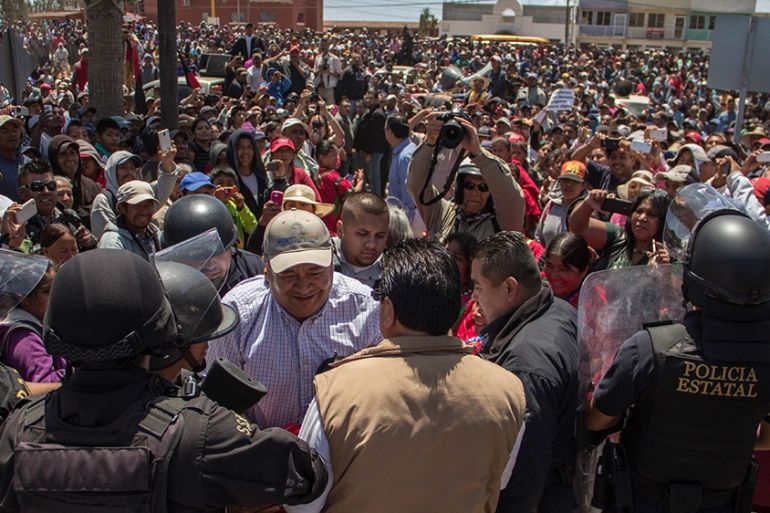Arrests as Mexico farming wage strike turns violent
Police fire rubber bullets and tear gas at striking farm labourers, who are pushing for pay rise to $13 a day.

San Quintín, Mexico – An agricultural wage strike in northwest Mexico turned violent over the weekend, ending with at least 70 injured – some badly – and dozens arrested.
The protests were mostly peaceful marches until Saturday morning, when police shot rubber bullets and tear gas at striking farm labourers. Protesters threw rocks at police, put out roadblocks to halt trucks carrying produce, took over a government building, and ultimately destroyed a police vehicle.
Keep reading
list of 4 itemsUS imposes new sanctions on Iran after attack on Israel
A flash flood and a quiet sale highlight India’s Sikkim’s hydro problems
Why is Germany maintaining economic ties with China?
Protesters said that police smashed down doors and windows to break into their homes early in the morning with no warning, and shot people at close range with rubber bullets.
“The state police who went into [the neighbourhood of] Vicente Guerrero did not follow government orders,” said Pablo Alejo Lopez, Baja California’s assistant interior secretary. “It is the ministry that has to investigate the actions of the state police, if there is evidence.”
![A police vehicle was destroyed during the violence over the weekend [José Pedro Martínez/Al Jazeera]](/wp-content/uploads/2015/05/baca99349c0f4d55be6aa11ac132e887_18.jpeg)
San Quintín, in Mexico’s Baja California, is normally a quiet seaside town, best known for its fishing, the seafood stands that dot its coastline, and its vast expanse of fields, stretching out over hundreds of kilometres.
The fertile San Quintín Valley is one of the largest suppliers of tomatoes and strawberries in the world. Its fields supply fruits and vegetables to large companies like Driscoll’s and BerryMex.
The valley and surrounding areas have also been the site of one of Mexico’s largest field workers’ strikes in recent history. The strikes began in March, when at least 20,000 labourers, demanding better pay and working conditions, walked off the job after salary negotiations stalled, protesting as strawberries rotted in the fields.
The leaders of the movement are demanding better wages, with raises to 200 pesos [about $13] a day, and more oversight on the farms themselves. They also want paid days off, access to water and healthcare, which is currently not offered by most employers.
The labourers were originally asking for 300 pesos [about $20] a day, but agricultural representatives and farm owners refused, saying it would bankrupt the region.
Currently, workers say they make between $4 and $10 a day, for hours of back-breakingly hard physical labour. Children are exploited for labour – many workers say they start in the fields at age 12 or 13 – and women and girls are routinely sexually harassed and assaulted.
![Labourers burned a police station in Vicente Guerrero during the unrest [José Pedro Martínez/Al Jazeera]](/wp-content/uploads/2015/05/bd3dbe328d84445b93bf2b68bbbf39a7_18.jpeg)
“I work seven days a week, 6am to 7pm, and make about 1100 pesos [about $70] for a week,” said Benito Ramirez, 25. He began working in San Quintín’s strawberry fields after he was deported from the United States. “That’s what I would get for a day when I used to work in a restaurant in the States.”
Like many people who live and work in Baja California’s agricultural industry, he is Triqui, an indigenous group from the south of Mexico.
“In the fields, there’s a bunch of old ladies and men working there, they only pay them 700 pesos [about $45] for a week. I don’t want my people to suffer for food, I want them to have everything good. Everybody needs a good life here,” said Ramirez.
The relations between the workers, the farms, and the state have been fraying over the past two months; negotiations at the table were repeatedly stalled by agriculture and state representatives walking out from meetings, or simply not showing up.
The strike has received little attention outside Mexico, other than some outlets noting that the price of fruits and vegetables from the region may rise. Activists hope to change that by calling for a worldwide boycott of produce grown in the San Quintín Valley.
Salary negotiations begin again on Wednesday.
![Leaders of the labourers' movement are demanding better wages, with raises to about $13 a day [José Pedro Martínez/Al Jazeera]](/wp-content/uploads/2015/05/97e7fa220d2a4c3b9be3fceda866b75d_18.jpeg)